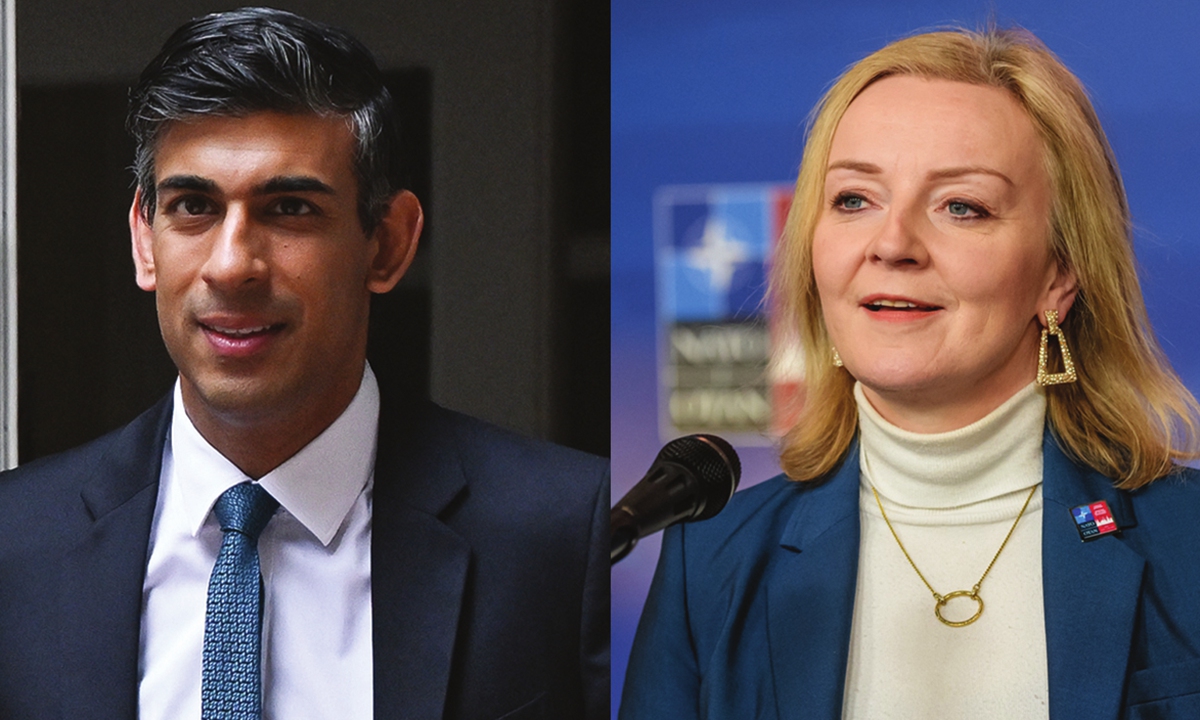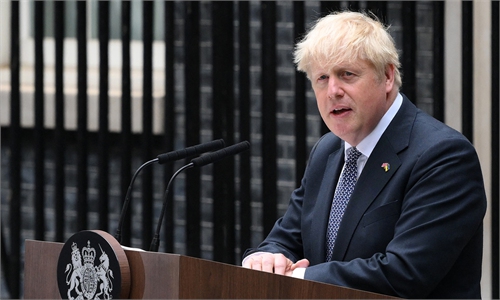
Photo: GT
From an original field of 11 candidates, now there are just two: Foreign Secretary Liz Truss and recently resigned chancellor of the exchequer, Rishi Sunak.
Both are committed Tories, and both clearly on the right wing of the UK politics. But they have massive policy differences, some of which, in different ways, will be significant for China when one of them becomes the replacement prime minister for Boris Johnson, who has been forced out of office following a series of scandals surrounding his government.
As far as China is concerned, there seems to be two possible outcomes: Truss the hawk, whose dogmatic attitudes toward China are, at best, confrontational, or Sunak, whose approach seems more nuanced and pragmatic. In this way, these elections will determine whether relations between London and Beijing will improve or worsen. For now, there is a kind of diplomatic interregnum in which nothing is likely to change until a new PM arrives and makes some serious policy decisions.
The method by which candidates are chosen is Byzantine, but the choice between the final two candidates is made by the party's 160,000 members - 71 percent of whom are male, more than half are aged over 60, more than one-third are clustered in England's wealthier southeast, and who are notorious for holding reactionary views, being resistant to meaningful change. Given those demographics, Sunak's and Truss's public statements between now and the final vote in September seem unlikely to be sympathetic toward China.
Truss is well known for her hostile statements toward China. She has called on the West to "make sure that Taiwan has the ability to defend itself," and accused Beijing of breaking "legally-binding commitments" over Hong Kong. She has enthusiastically promoted of a "network of liberty" initiative to link countries with shared economic interests, if not values, and which is seen as part of a pushback against China with its Belt and Road Initiative. She ordered the withdrawal of British judges from Hong Kong and backed the diplomatic boycott of the Beijing Winter Olympics.
When she warned earlier this year that China could launch a war of aggression in the Indo-Pacific because of Russia's war in Ukraine, Australia's former premier Paul Keating said her comments were "nothing short of demented. Not simply irrational - demented." But she takes criticism often as confirmation of the correctness of her views. She is well-versed in all of the usual Western anti-China talking points including Xinjiang, Hong Kong, Taiwan, and as predictably ill-informed. Interestingly, she was supposedly nicknamed the "human hand grenade" by Johnson's chief advisor Dominic Cummings.
The other contender, Sunak, has approached China - before he resigned - with an attitude of pragmatic engagement. It is still a long way from the years of the David Cameron premiership, when the then PM and his chancellor George Osborne spoke of a "golden age" of relations between the two countries. After an initial period of relative estrangement at the start of the Johnson administration, the British government has been more recently working toward a rapprochement with Beijing.
Sunak has pushed to improve business relationships between the two countries and was behind the drive to reestablish the UK-China Economic and Financial Dialogue last year (though plans to begin discussions this month unraveled when Sunak, and later Johnson, announced their resignations). Sunak has been critical of Beijing, and in February blamed China for pushing up global energy prices. Nevertheless, he as prime minister would be the politician most likely to adopt a realpolitik approach, if only to focus on attracting heavy investment in the UK from China - a sharp contrast with the right wing caucus forming around Truss.
It is impossible to gauge accurately how the Tory membership will vote. The received wisdom of many observers is that Sunak appeals most to the British electorate and would stand the most chance of winning any forthcoming general election. Truss, on the other hand, while less popular with the wider electorate, is thought to be hugely popular among the staid Conservative membership. Ironically, if she was elected leader - and therefore automatically became the next prime minister - it would probably increase the Tories' chances of losing the next general election, heralding almost certainly the return of a Labor government for the first time in more than a decade.
Over the past few weeks, the ultra-conservative newspaper the Daily Mail - whose modest circulation of about 800,000 copies a day belies its disproportionate influence on the UK's political discourse - has been openly campaigning to get Truss chosen as party leader with blatantly positive stories about her and negative ones about other candidates - especially those who, like Sunak, most threaten her.
On Wednesday, the newspaper confected a report based upon coverage of the party leadership elections in the Global Times. It characterized balanced reporting of the Global Times as being suspiciously sympathetic toward Sunak and therefore implying his disloyalty to Britain. It was what British journalists themselves might describe as a clumsy "attack job," with obvious political motivations. The question to ask, however, is why did it do this?
From the evidence so far it seems that the belligerents are in the ascendant and China may have its work cut out forming a harmonious relationship with the UK when the new prime minister takes over in September. The hawks would have us turn the clock back, instead of moving forward together. And, who knows, the Daily Mail might even see this article as proof of Sunak's "traitorous" tendencies.
The author is a journalist and lecturer living in Britain. opinion@globaltimes.com.cn



